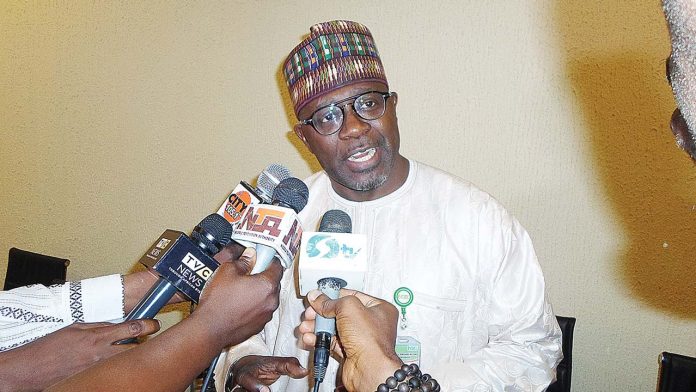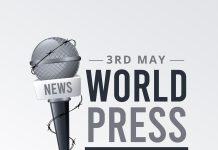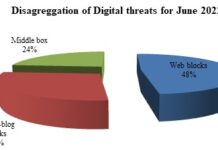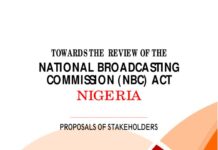As Nigeria approaches its 20th year of uninterrupted democratic governance, which would also see a new political dispensation come to light, it is important to examine the key sector and regulatory bodies that help in shaping democracy.
The media plays a vital role in any democratic society, but without proper regulatory body, it could mar the system.
The media is guided by certain rules and regulations to ensure that its privileges are not abused at the expense of the audience, most of whom feed on what they hear, see or read.
The National Broadcasting Commission (NBC), the Nigerian Press Council (NPC) and the Advertising Practitioners Council of Nigeria (APCON) are responsible for checking these abuses, but it has been argued that they have not lived up to expectations, leaving many to ask if they are still relevant.
The APCON is the body in charge of regulating and monitoring every advertisement and granting approvals through the Advertising Standards Panel (ASP) before a particular advertisement can be published in any media (print, electronic, outdoor).
According to the APCON Act, all advertisements shall be legal, decent, honest, truthful, respectful and mindful of Nigeria’s culture.
They should be prepared with a high sense of social responsibility and should avoid misinformation; conform to the principles of fair competition generally accepted in business, and of fair comments expected in free human communication.
It would be recalled that few weeks ago, NBC cautioned Ekiti Radio for being highly unprofessional and dangerously partisan in its reportage of the gubernatorial democratic process in the state.
NBC had stated that the station had consistently refused to balance its political programmes, often patronising the state governor and his party alone in breach of Section 7.6.8.
It noted in a statement a recent infraction, where the station in a broadcast incited citizens of the state not to welcome the President to the state.
“We find this as a breach of Section 5.2.7 of the Code and 5.2.8.
A broadcaster shall, in using political material for news, avoid taking inflammatory and divisive matter in its provocative form,” NCB said in a statement signed by its Director General, Is’haq Modibbo Kawu.
A critical analysis of the role of the media in the 2015 General Elections would give a verdict of poor performance.
This is with respect to the tone or content and the extreme partisanship without exception.
It is not that in electioneering campaigns, issues that would favour a candidate or disadvantage an opponent may not be resorted to as such, but there is always an established boundary in journalistic practice.
In point of fact, the media is expected to respect such “no-go areas” at all times.
According to a report by the European Union, major Nigerian media outlets were biased while reporting the 2015 elections campaigns.
Between January 16 and April 9, 2015, the EU observation mission monitored three national televisions (NTA, AIT and Channels TV); two national radio stations (FRCN and Ray Power) and three daily newspapers (Daily Trust, The Guardian and ThisDay).
Channels TV demonstrated “generally balanced reporting of key political contestants, while the three newspapers monitored, “offered relatively balanced and diverse coverage,” says the report.
When The Guardian reached out to the Ag. Registrar of APCON, Mrs. Ijedi Iyoha, she said as a way forward, APCON has stepped up its sensitisation drive on ethical political advertising.
“To APCON, the 2019 General Election is not different from the other elections, as we have been in consistent fight against hate speech in political advertising.
“Political parties and campaign organisations are continually being educated and enlightened to ensure that full compliance with the provisions of the Nigerian Code of Adverting Practice pertaining to political advertising.
Specific programmes/forums are organised by APCON or in conjunction with credible organisations to explain the responsibilities and obligations of every player towards political advertising.
“Media houses are equally carried along in this exercise since they are vital to information dissemination and are directly or indirectly relied upon by sponsors of political advertisements.
We continuously insist that political advertisements must be vetted before exposure.
Where hate speech or unsubstantiated claims are made or detected, approval for exposure is denied,” she said.
She also noted that different measures were adopted as part of effort to ensure compliance with relevant laws on advertising campaigns.
“There are payable fines for advertisers, media houses, advertising agencies and practitioners respectively involved in any breach of the provisions of the Code regarding political advertising.
Physical removal of the violating advertisement could be deployed in cases that are obtainable.
“We also notify appropriate agencies of government that exercise regulatory functions on matters affected by the acts of hate speech broadcast,” Iyoha added.
However, the Director of International Press Centre (IPC), Mr. Lanre Arogundade, said the publication of political adverts by parties or their sympathisers did not constitute partisanship on the part of the media.
“What amounted to partisanship in the past and what would still be considered as partisanship is where a news medium publishes an advertorial without so indicating, thus, giving the impression that such represents the opinion of the medium.
The publication of some wrap-around adverts by some newspapers in the past comes to mind here.
“They were made to appear as news whereas they were sponsored.
Meanwhile, fundamentally, the front pages should not be sacrificed for adverts but most newspapers often argue that they need the money to survive,” he said.
Arogundade advised that the media desist from the publication of political hate advertorials that seek to denigrate political opponents on the basis of race, ethnicity, gender, disability, and so on.
“The attention of all journalists and media houses should be drawn to the provisions of The Nigerian Media Code of Election Coverage, with regards to this,” he added.
He stated that IPC was carrying out wide dissemination of the code of election coverage and carrying out enlightenment on its provisions frowning against hate speech, including hate advertorials.
“We are hopeful that the endorsement of the code by umbrella media professional bodies and associations and individual media houses will be useful also.
“IPC is calling on the close to hundred media institutions that endorsed the code to enlighten their staff to help promote compliance.
Enlightenment on the code will also feature I’m the series of trainings we are planning for journalists, political correspondents, bloggers, etc in the six get political zomes within the next three months to prepare them for 2019 elections,” he stated.
President Nigeria Guild of Editors, Mrs. Funke Egbomode, was hopeful that the gatekeepers would do what stands them out as professionals, bearing in mind their responsibility to the country.
“We would remind our members to continue to shape this democracy.
Editors would serve as gatekeepers to ensure we don’t fall into the temptation of getting emotional about anything in the course of reporting the elections. Though we cannot stop politicians from doing what they do.”
On the issue of ownership interference, Egbomode said it was quite unfortunate as there was little an editor could do to stop the decision of the owners of such businesses.
“I think this issue of ownership is overrated, people do not put their money in businesses for them not to have a say in what happens in their businesses.
At times, we tend to forget that media houses are businesses that pay taxes, vat and pension. The gatekeeper cannot tell the owner of the business how to run it.”
Director, Broadcast Monitoring, NBC, Prof. Armstrong Idachaba said the principal thing to know was the broadcasting code, which guides the media in election processes.
“The code is very detailed regarding political broadcasting. Broadcasters are supposed to do as professionals, by being conversant with all the provisions of the broadcasting code and the regulations related to political broadcasting, which entails fairness and balance.
The code also stated that broadcasters must not announce election results, as only authorised bodies like the INEC could do so.”
Idachaba noted that the NBC had a ritual of inviting stakeholders before any election, to remind them of the codes, as well as distributing the code to media houses.
He said over time, the pre-election meetings with the stakeholders have proved that inspite of every effort made by the NBC, compliance is usually low, though he commended Anambra for fair compliance at the last election.
















